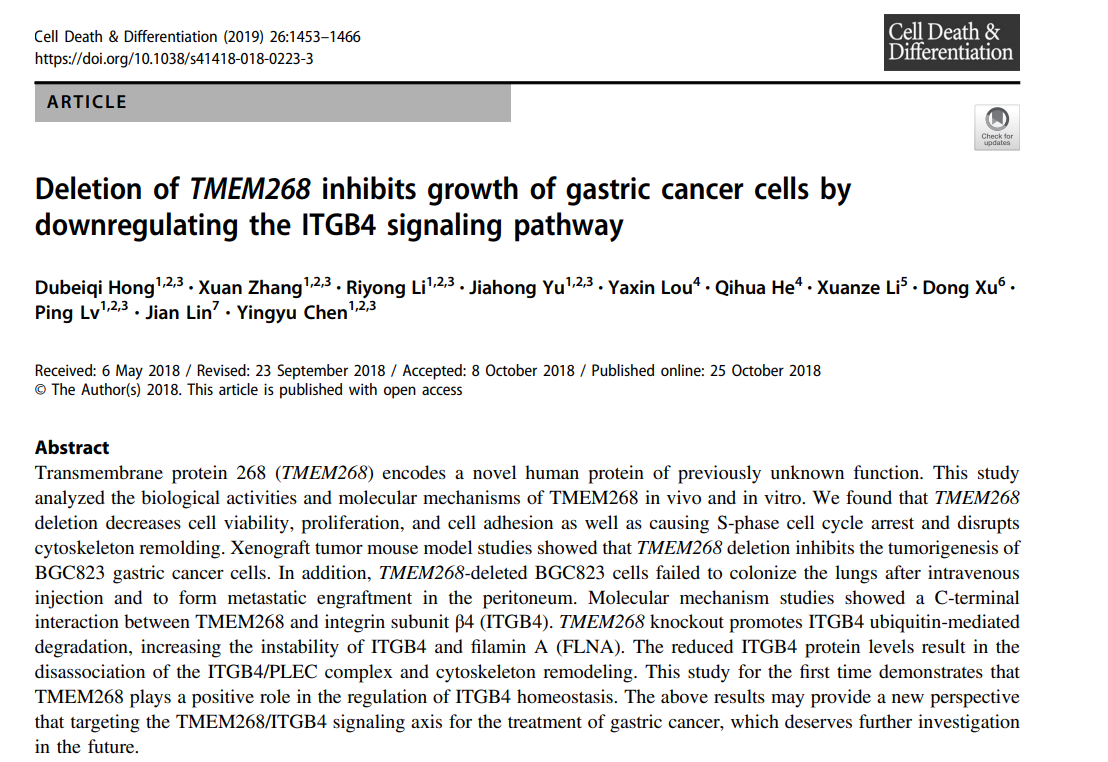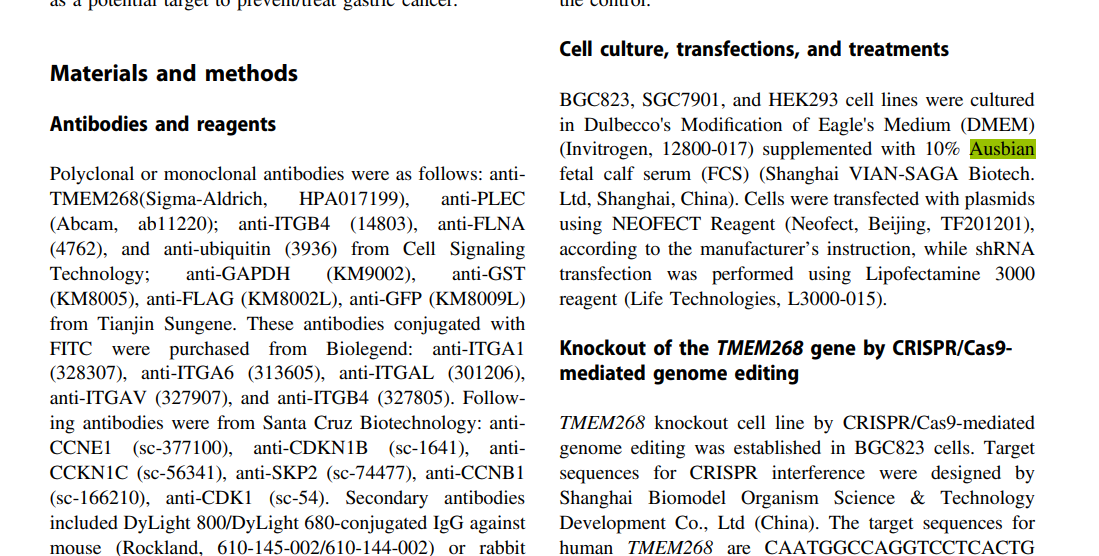TMEM268缺失通過(guò)下調(diào)ITGB4信號(hào)通路抑制胃癌細(xì)胞生長(zhǎng) 二維碼
發(fā)表時(shí)間:2024-09-09 15:52 2018年9月,北京大學(xué)基礎(chǔ)醫(yī)學(xué)院免疫學(xué)教研室;北京大學(xué)國(guó)家衛(wèi)生健康委醫(yī)學(xué)免疫學(xué)重點(diǎn)實(shí)驗(yàn)室;北京大學(xué)中國(guó)人類疾病基因組學(xué)研究中心;北京大學(xué)中國(guó)醫(yī)藥衛(wèi)生分析中心;中國(guó)科學(xué)院理化技術(shù)研究所光化學(xué)轉(zhuǎn)化與光電材料中國(guó)重點(diǎn)實(shí)驗(yàn)室;北京大學(xué)**醫(yī)院中國(guó)臨床檢驗(yàn)科;中國(guó)化學(xué)與分子工程學(xué)院;北京大學(xué)基因組學(xué)創(chuàng)新中心(Inner Mongolia Medical University Affiliated Hospital, Hohhot, Inner Mongolia, People’s Republic of China) Yingyu Chen老師研究團(tuán)隊(duì)在《Cell Death & Differentiation》上發(fā)表論文: “Deletion of TMEM268 inhibits growth of gastric cancer cells by downregulating the ITGB4 signaling pathway” “TMEM268缺失通過(guò)下調(diào)ITGB4信號(hào)通路抑制胃癌細(xì)胞生長(zhǎng)” Abstract: Transmembrane protein 268 (TMEM268) encodes a novel human protein of previously unknown function. This study analyzed the biological activities and molecular mechanisms of TMEM268 in vivo and in vitro. We found that TMEM268 deletion decreases cell viability, proliferation, and cell adhesion as well as causing S-phase cell cycle arrest and disrupts cytoskeleton remolding. Xenograft tumor mouse model studies showed that TMEM268 deletion inhibits the tumorigenesis of BGC823 gastric cancer cells. In addition, TMEM268-deleted BGC823 cells failed to colonize the lungs after intravenous injection and to form metastatic engraftment in the peritoneum. Molecular mechanism studies showed a C-terminal interaction between TMEM268 and integrin subunit β4 (ITGB4). TMEM268 knockout promotes ITGB4 ubiquitin-mediated degradation, increasing the instability of ITGB4 and filamin A (FLNA). The reduced ITGB4 protein levels result in the disassociation of the ITGB4/PLEC complex and cytoskeleton remodeling. This study for the first time demonstrates that TMEM268 plays a positive role in the regulation of ITGB4 homeostasis. The above results may provide a new perspective that targeting the TMEM268/ITGB4 signaling axis for the treatment of gastric cancer, which deserves further investigation in the future. 摘要: 跨膜蛋白268 (TMEM268)編碼一種新的功能未知的人類蛋白。本研究分析了TMEM268在體內(nèi)和體外的生物活性和分子機(jī)制。科研人員發(fā)現(xiàn)TMEM268缺失會(huì)降低細(xì)胞活力、增殖和細(xì)胞粘附,并導(dǎo)致s期細(xì)胞周期停滯,破壞細(xì)胞骨架重塑。異種移植腫瘤小鼠模型研究表明,TMEM268缺失抑制BGC823胃癌細(xì)胞的腫瘤發(fā)生。此外,tmem268缺失的BGC823細(xì)胞在靜脈注射后不能在肺部定植,也不能在腹膜形成轉(zhuǎn)移性移植物。分子機(jī)制研究表明,TMEM268與整合素亞基β4 (ITGB4)之間存在c端相互作用。TMEM268敲除促進(jìn)ITGB4泛素介導(dǎo)的降解,增加ITGB4和絲狀蛋白A (FLNA)的不穩(wěn)定性。ITGB4蛋白水平的降低導(dǎo)致ITGB4/PLEC復(fù)合物的分離和細(xì)胞骨架重塑。本研究**證實(shí)TMEM268在ITGB4穩(wěn)態(tài)調(diào)控中發(fā)揮積極作用。上述結(jié)果可能為靶向TMEM268/ITGB4信號(hào)軸治療胃癌提供了新的視角,值得未來(lái)進(jìn)一步研究。 該論文中,BGC823、SGC7901和HEK293的體外培養(yǎng)是使用Ausbian特級(jí)胎牛血清完成的。欲了解或購(gòu)買Ausbian特級(jí)胎牛血清可以聯(lián)系北京締一生物400-166-8600.
|
|





